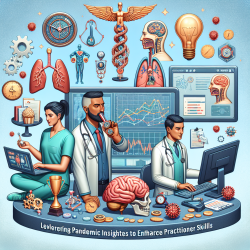Introduction
The COVID-19 pandemic presented unprecedented challenges for healthcare professionals worldwide. A recent study, "Pride and adversity among nurses and physicians during the pandemic in two US healthcare systems: a mixed methods analysis," provides valuable insights into the experiences of nurses and physicians during this period. By examining these insights through the lens of Self-Determination Theory (SDT), practitioners can enhance their skills and improve mental health outcomes.
Understanding Self-Determination Theory
Self-Determination Theory posits that autonomy, competence, and relatedness are essential for psychological well-being. The study found that experiences supporting these needs fostered pride, while those thwarting them led to distress. This framework can guide practitioners in creating supportive environments that enhance well-being.
Key Findings and Implications
- Autonomy-Supportive Experiences: Practitioners who experienced autonomy-supportive environments reported higher levels of pride and lower levels of depression. Encouraging autonomy by allowing input in decision-making can lead to better mental health outcomes.
- Competence and Relatedness: Experiences that enhanced competence and relatedness, such as teamwork and community support, were associated with reduced anxiety and depression. Practitioners should foster environments that promote collaboration and community engagement.
- Impact of Distressing Events: Distressing events were linked to increased anxiety and depression. Identifying and addressing these sources of distress through supportive policies can mitigate their impact.
Practical Applications for Practitioners
Practitioners can implement these findings by fostering autonomy-supportive environments. This involves:
- Encouraging open communication and input from team members.
- Providing opportunities for professional development to enhance competence.
- Building a sense of community and support among colleagues.
By applying these strategies, practitioners can create environments that not only improve mental health outcomes but also enhance overall job satisfaction and performance.
Encouraging Further Research
While this study provides valuable insights, further research is needed to explore the long-term effects of autonomy-supportive environments on mental health. Practitioners are encouraged to engage in research initiatives to continue improving healthcare practices.
To read the original research paper, please follow this link: Pride and adversity among nurses and physicians during the pandemic in two US healthcare systems: a mixed methods analysis.










